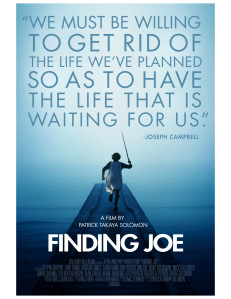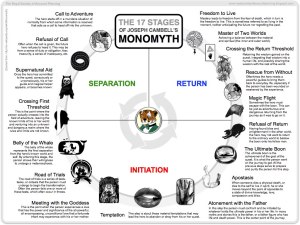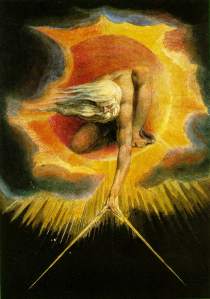You should really check out this movie: Finding Joe. It is about Joseph Campbell’s monomyth or “Journey of the Hero” as they call it in the movie. I bought it and didn’t regret it. It presents the monomyth in terms that a layperson unfamiliar with Campbell can understand. If you’re looking for a biography of Campbell or a study of ancient myth, this is not it. The movie tells the story of the monomyth in very general terms and only tangentially and infrequently mentions ancient myth. Instead, it presents the theory in terms that people who are not interested in mythology, but are interested in personal development, can appreciate. The imagery is beautiful and the soundtrack is moving, if somewhat monotonous. The movie has children playing various parts in the monomyth and it is beautifully filmed.

I showed it to my wife and my 12 year old son, and they loved it. I was a little disappointed that it did not discuss ancient myth more, but this makes it more accessible to a general audience.
Campbell’s monomyth has always been a powerful influence on me. I first picked up The Hero With a Thousand Faces in a train station bookstore on my way to college. Later I read the Masks of God trilogy and other books by Campbell. When I started exploring Paganism and my wife was wondering what the hell I was involved with, I drew on Campbell’s Hero to explain it:
Everybody has a ‘secret life’ or a secret part of themselves. If somebody doesn’t think they do, it’s just because that secret part is secret even from them. And not everything that is in the secret place is pretty, nor is everything in that place ugly just because it is secret. That is what Joseph Campbell meant when he wrote: The unconscious is that
“realm we enter in sleep. We carry it within ourselves forever. All the ogres and secret helpers of the nursery are there, all the magic of childhood. And more importantly, all the life-potentialities that we never managed to bring to adult realisation, those other portions of ourselves, are there; for such golden seeds do not die. If only a portion of that lost totality could be dredged up into the light of day, we should experience a marvelous expansion of our powers, a vivid renewal of life. We would tower in stature.”
What I’m involved in now is an exploration of that place (of the “ogres” and “secret helpers”), through myth and symbol and ritual. This exploration, this journey, is what is sacred to me. […]
In addition to the myths of the seasonal cycle, cultures across time have told stories of a symbolic hero who journeys to the underworld to accomplish some task, and returns bringing light or enlightenment to the world. Joseph Campbell calls this the “monomyth”, because, while the stories vary in their details, they all have the same structure. […]
This “hero’s journey”, as Campbell points out, is reflective of a psychological journey that leads to the reconciliation of our divided psyche and spiritual wholeness. He draws on Jung heavily. Campbell and Jung and others like him were concerned that, as many people experience a loss of meaning of traditional religious symbols and rituals, that they are left without “guides” to help them in their journey. Their world becomes overly rational, devoid of the richness that symbol and myth bring to one’s life. They attributed the pandemic of “soul-sickness” that they saw to this rootlessness. Jung suggested that we needed new myths, but only began to hint at an outline of one. Campbell, on the other hand, offered his readers the myths of myriad cultures as substitute guides. This is what he meant when he wrote: We do not have
“to risk the adventure alone, for the heroes of all time have gone before us — the labyrinth [the path to the unconscious] is thoroughly known. We have only to follow the thread of the hero path [the myths], and where we had thought to find an abomination [the “ogres”], we shall find a god; where we had thought to slay another, we shall slay ourselves; where we had thought to travel outward, we shall come to the center of our own existence. And where we had thought to be alone, we shall be with all the world.”
I am researching these myths, studying them, picking and choosing, part-deliberately and part-intuitively, integrating them, and creating myths for myself and rituals to accompany them.
I have seen reviews of the film that said it was like an infomercial, filled with talking heads, redundant and platitudinous. I can certainly understand those reactions. But I love Campbell and his message too much not to love this movie.
As I watched Finding Joe with my family, the word that kept coming to mind, strangely enough, was “gospel”, as in “good news”. I thought, “This is my gospel!” Perhaps it was because the movie had an almost missionary-like atmosphere to it that reminded me of movies produced by the the Mormon church for their missionary efforts. In any case, although this no one featured in this movie was Neopagan, I felt that it truly captured the reason for my interest in Neopaganism.












